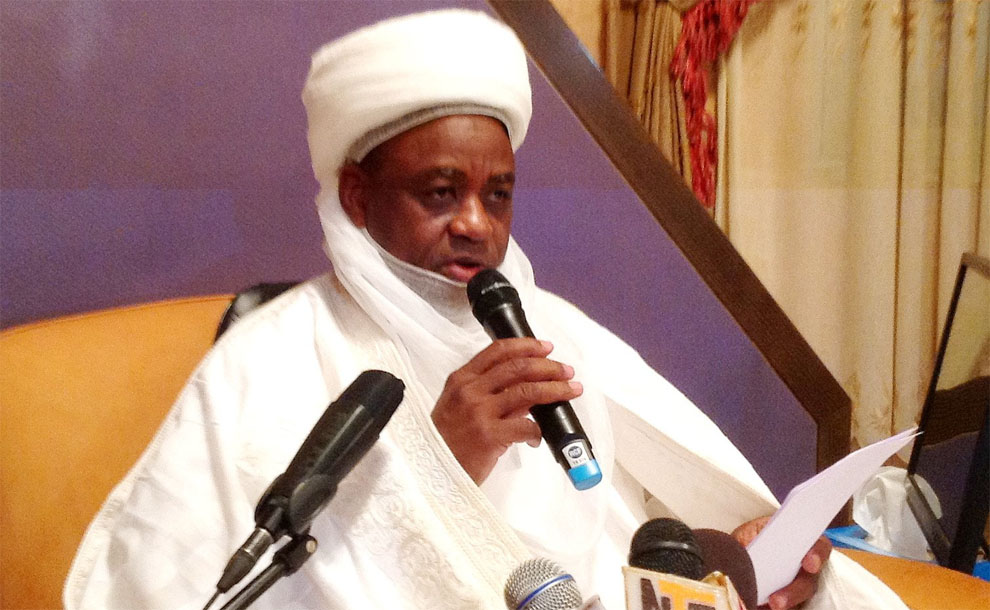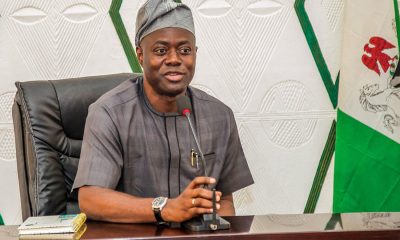metro
Fuel Scarcity: Navy claims NNPC has been lying about oil theft

The Nigerian Navy has accused the Nigerian National Petroleum Corporation Limited (NNPCL), formerly Nigerian National Petroleum Corporation (NNPC), of providing false information about crude oil theft in the country.
The Punch got Rear Admiral Solomon Agada on record at a brief with the Senate Committee on Economic and Financial Crimes at the National Assembly on Thursday.
Agada, the Navy Chief of Training and Operations, told the Senate committee that the navy had explained the causes of fuel scarcity to NNPC but the corporation continued to reel out bogus information.
Aguda also said that it was not possible to steal 100,000 barrels of oil daily on Nigerian waters.
“The oil theft issue has been a very worrisome one to every Nigerian and more importantly, it has negatively impacted our economy. How come the Navy hasn’t been able to solve the issue of oil theft and if the Navy is claiming that the waterways are secured, why are there still cases of oil theft?” Suleiman Kwari, chairman of the Senate committee, asked Agada.
“The challenge is that because of the criminal activity inshore by the illegal refiners in tapping into the export lines, those export lines have not been in operation since early this year,” Agada responded.
“The major terminals have not been able to process fuel for export since around February/March and instead of the NNPC telling the Federal Government that this product is not brought out to be able to process as export, they say the oil was stolen.”
READ ALSO:
- Mbappe scores brace as France beat Poland 3-1
- Crisis rocks Osun as PDP Chieftain accuses Adeleke of demolishing his hotel for exposing his certificate scandal
- Atiku, Obi, Kwankwaso In Attendance As Tinubu Shuns Arise TV Town Hall Meeting
Agada also said that the navy wanted the NNPC to reveal the difference between crude oil that has not been brought out and crude oil that has been stolen.
According to Agada, the NNPC had shut in some volumes of crude oil but reported that most of it was being stolen.
“The stolen produce that we have been dealing with among illegal refineries is nothing compared to what the NNPC is declaring as being stolen,” Agada explained.
“If you’re talking about stealing 100,000 barrels a day, you need about five-tonne batches 20 times a day from the creek to the high sea, which is very unrealistic. I told them at the NNPC that if that were to be the case, even a blind man would observe that something was happening in Nigeria’s waters, and we are there on patrol and not seeing this.
“The only reasonable explanation why the fuels are not coming out is because the Shell platform on Bonny Island is not exporting and the Chevron terminal in Escravos is also not exporting. All these things are very clear, but because it is easier to say these things are stolen, then they just come up with that.
“Let’s get someone who can do proper analysis of these figures and we’ll find out that these claims are just bogus; there is nothing substantive about them. We have communicated appropriately with the NNPC. Even at our last interface with them, they agreed with us,but when they come to the public, they say oil theft, hiding the fact from the public.”
READ ALSO:
- QATAR 2022: England ease past loose Senegal with 3 goals
- Hold Peter Obi, supporters responsible if anything happens to me – Reno Omokri
- Why I surederred to Nigerian Army ‘repentant’ Boko Haram commander, Rugurugu
Agada also said that the hike in diesel price was due to a decrease in supply of diesel after the navy halted illegal bunkering in April.
The naval chief claimed that some marketers who had been patronising illegal bunkering were now unable to do so.
“People who have been doing this illegal business will confirm to you that since we started this special task force operation in April, their business has gone sour,” he said.
“This is also responsible for the increase in diesel price in the country. Since we stopped the illegal diesel from coming to the market, the price has gone up, because once there is high demand and the supply is low, the price will go up.
“People who ought to import will cut corners and buy the illegal products, but now that they can’t import and the illegal ones are not coming, this has reduced the quantity in the country. But somehow, nobody is coming to share this information with the people.”
FIJ
metro
UK hikes visa fees as new rates take effect April 9

UK hikes visa fees as new rates take effect April 9
The United Kingdom Home Office has announced an upward revision of visa application fees across various categories, with the cost of study visas for main applicants and their dependents rising from £490 to £524.
According to an update published on the Home Office website on March 19, the new fees will apply from April 9. The cost of a six-month visit visa will increase from £115 to £127, while a two-year visa will now be issued at £475, up from £432. Additionally, the fee for a 10-year visa has been raised from £963 to £1,059.
Transit visas have also been affected by the changes, with the direct airside transit visa fee increasing from £35 to £39, and the direct landside visit visa rising from £64 to £70.
READ ALSO:
- Ex-Rivers HoS wife cries for help over husband’s safety
- Fubara reacts as Ex-HOS, Nwaeke accuses him of bombing oil pipelines, Rivers Assembly
- Natasha: Emmanuel Uduaghan threatens to sue Senator Nwaebonyi
The UK has long been a preferred destination for Nigerian students looking to further their education, often as a way to escape economic challenges at home. However, the number of Nigerian students applying to study in the UK has dropped significantly in 2024 following a government policy barring most international students from bringing their family members.
The rule, which does not apply to postgraduate research students, has led to a decline in study visa applications from countries such as Nigeria and India. A March 2024 report by the Universities and Colleges Admissions Service highlighted the shift, noting that many prospective students are now seeking admission in alternative destinations.
UK hikes visa fees as new rates take effect April 9
metro
Ramadan ends in Nigeria, Sultan announces March 30 as Eid-el-Fitr

Ramadan ends in Nigeria, Sultan announces March 30 as Eid-el-Fitr
Sultan of Sokoto, Muhammad Abubakar Sa’ad, says the crescent moon marking the end of Ramadan fasting has been sighted.
The Sultan, who is president of the Supreme Council for Islamic Affairs (NSIA), said in a broadcast on Saturday night, “Today marks the end of the Ramadan fasting and Sunday, March 30, is the Eid-el-Fitr celebration.”
metro
Embrace environmental sanitation during Eid-Fitr, LAGESC boss tells Lagosians

Embrace environmental sanitation during Eid-Fitr, LAGESC boss tells Lagosians
By Dada Jackson
The Lagos Environmental Sanitation Corps (LAGESC) has urged Lagosians to embrace proper environmental practices and obey the state’s environmental laws ahead of the Eid-l-Fitr festivities to mark the end of the Ramadan fast by Muslim faithful around the world.
Corps Marshal of the agency, Major Olaniyi Olatunbosun Cole (retd), sounded the call at the agency’s command headquarters at Bolade-Oshodi.
He said, ‘‘The Ramadan fast is a testament to the willingness of Muslim faithful to adhere to the pillars of their faith and it is enjoined that cleanliness is an important religious practice in all faiths, which is why we admonish Lagosians to imbibe proper waste disposal and keep their environment clean during the celebration.”
Cole also advised Lagosians to make proper use of pedestrian bridges for their safety instead of crossing highways to prevent ‘hit and run’ cases by speeding motorists.
He equally read a riot act to miscreants in the habit of converting pedestrian bridges to sleeping areas which deters Lagosians in transit, pedestrians vowing that anyone caught w be made to face the state Environmental laws as amended
The KAI boss also revealed that the agency had recorded giant strides and would not relent in ridding pedestrian bridges across Lagos of criminal obstructions, traders and hawkers with daily arrests made alongside secured prosecutions by the Courts.
The Corps Marshal also warned Lagosians to desist from street trading, use of Styrofoam pack, hawking in traffic, patronage of cart pushers for refuse disposal, and erection of illegal structures on laybys, setbacks, medians, road verges, kerbs or around public schools in the state.
The KAI head said offenders would be made to face the consequences via prosecution in a competent court of appropriate jurisdiction.
-

 Uncategorized1 day ago
Uncategorized1 day agoBreaking: Moon sighted in Saudi, UAE, others, Eid-Fitr holds Sunday
-

 metro2 days ago
metro2 days agoEFCC re-arraigns son of ex-PDP chairman for alleged N2.2bn oil subsidy fraud
-

 metro19 hours ago
metro19 hours agoRamadan ends in Nigeria, Sultan announces March 30 as Eid-el-Fitr
-

 metro1 day ago
metro1 day agoFubara reacts as Ex-HOS, Nwaeke accuses him of bombing oil pipelines, Rivers Assembly
-

 metro2 days ago
metro2 days agoWe welcome Gov Makinde’s U-turn on Shari’ah panel – MURIC
-

 Opinion1 day ago
Opinion1 day agoBarbaric mass burning of innocents in Edo, by Farooq Kperogi
-

 Uncategorized2 days ago
Uncategorized2 days agoObasanjo’s position on Rivers emergency rule hypocritical, says Presidency
-

 metro1 day ago
metro1 day agoEx-Rivers HoS wife cries for help over husband’s safety









